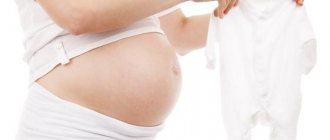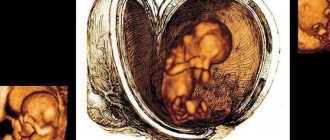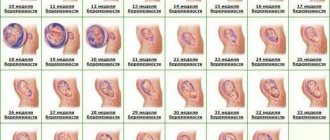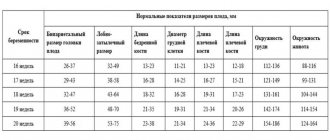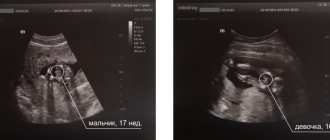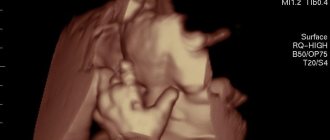Pregnancy: Pixabay The 36th week of pregnancy is a period of active preparation of mother and baby for the upcoming meeting. The child moves actively, shows joy or dissatisfaction with powerful pushes. At this time, the harbingers of childbirth appear - this is how the body prepares the pregnant woman for the most important stage of the entire pregnancy period. I’ll tell you in more detail what happens at the 36th week with two interconnected organisms - mother and child.
Interesting Facts
| Options | Indications |
| Time from conception | 34 weeks |
| Period by month | 36 weeks |
| What month | 9 |
| Dimensions and weight of the fetus | 475 mm, 2600 g |
| Uterus dimensions | VDM - 32-34 cm |
| Pregnant weight | Gain from the beginning of pregnancy is 10-14 kg; over the last week 400-500 g |
Your baby is the size of
Papaya
475 mm Size
2600 g Weight
Congratulations! You are at the finish line. By the end of the 36th week of pregnancy, all organs and systems of the baby are fully formed. Now he is engaged in building up fat tissue. Your task is to accumulate strength, rest at the first opportunity and tune in to a positive mood.
Feelings of the expectant mother
Due to your heavier belly, enlarged breasts and stiffness in your movements, you may feel tired and overwhelmed at 36 weeks. But breathing, most likely, has become easier, and the heartburn has subsided, because at this stage the stomach drops into the pelvis, and the uterus no longer puts pressure on the diaphragm and stomach.
Precursors of labor in first-time mothers
About 2 weeks before the expected birth, instead of progesterone, estrogens begin to play a dominant role in the hormonal background, the concentration of which determines the rate of dilatation of the cervix at the onset of labor. A pregnant woman may feel the following changes in sensations and well-being:
- weight loss and disappearance of swelling - this is how the body gets rid of excess fluid before childbirth;
- changes in stool - thinning to the point of diarrhea and frequent urges - another way to eliminate fluid;
- discharge of the mucus plug from the cervical canal - this is a jelly-like discharge, light or yellowish, sometimes mixed with blood;
- training contractions are chaotic contractions of the uterus that last a few seconds; the woman notes that she is pulling in her lower abdomen, but the pain goes away on its own.
Multiparous women experience the same symptoms, the only difference is that they may appear 1-2 weeks earlier and be more pronounced also because an experienced mother can already distinguish them from other conditions.
How you feel
Some expectant mothers may experience increased skin itching at 36 weeks of pregnancy. Most often it appears in the abdominal area. At the site of scratching, the skin turns red and becomes covered with pimples. If you use body moisturizers and the discomfort still does not go away, it may be pregnancy dermatitis. Just in case, see a dermatologist.
At 35–36 weeks of pregnancy, insomnia may still persist. It's all due to a big belly, frequent trips to the toilet, and sometimes nightmares. Before going to bed, try to relax: listen to calm music, ask your husband to give you a light massage, and to get up less often, do not drink a lot of liquid at night.
Often, women experience hemorrhoids during this period. And if previously only pain, itching and bleeding were observed, now nodules may appear. It is very important not to let the disease progress, as without treatment the problem will only get worse.
At 36 weeks of pregnancy, the likelihood of swelling increases. Everything is explained by the difficulty in the outflow of blood from the lower part of the body. Most often, swelling appears towards the end of the day after prolonged sitting or standing. To prevent their occurrence, change your body position more often and periodically do a warm-up.
By the end of the 35th - 36th week of pregnancy, training contractions become more and more noticeable, and this is normal, because the body is intensively preparing for the upcoming birth. But unlike real ones, they are practically painless and do not last long.
What happens to the fetus
At 36 weeks of pregnancy, the baby's weight averages 2.6 kg, and it becomes increasingly difficult for him to move freely. Therefore, the mother feels all the movements and even the way the child hiccups quite clearly. Usually by this time the fetus is turned head down, arms and legs are pressed to the body. He will remain in this position until he is born.
There is less lanugo and cheese-like lubricant on the baby’s body. The baby swallows them along with the amniotic fluid, which is how meconium is formed - the baby's first stool.
Tests and ultrasound
The thirty-sixth week of pregnancy is the optimal time for the following studies:
- biochemical blood test - to assess the general health of the mother, hemoglobin levels, hormones, etc.;
- test for HIV, sexually transmitted infections - to determine labor tactics;
- gynecological smear - will reveal the presence of pathogenic microflora;
- A general urine test will indicate possible problems in the functioning of the kidneys and urinary system.
You will also need to undergo a CTG: the fetal heartbeat can be used to diagnose hypoxia and other disorders in a timely manner.
Ultrasound at the 36th week of pregnancy is performed according to indications, if it has not been prescribed previously or for additional diagnostics with accompanying symptoms.
Good to know
Why does premature birth occur?
Which baby is considered premature?
How to test for amniotic fluid leakage at home
What is “oligohydramnios” during pregnancy?
Malpresentation of the fetus
How does childbirth occur with a breech presentation of the fetus?
All texts for pages about mother and baby were kindly provided by RAMA Publishing - these are chapters from the book by Svetlana Klaas “Your Favorite Little Man from Conception to Birth”, reviewer Irina Nikolaevna Kononova, Candidate of Medical Sciences, Associate Professor of the Department of Obstetrics and Gynecology of the Ural State Medical Academy (Ekaterinburg).
What to discuss with your doctor
- If tests reveal that you have low hemoglobin levels, talk to your doctor about what medications you can take. This condition cannot be corrected with diet, and your lack of iron means the same deficiency in your child.
- Breech presentation, that is, with the buttocks toward the cervix, is the reason for cesarean section in many cases. But in general, the baby has another 1-2 weeks to roll over. Find out from your gynecologist what exercises can help with this and when you should come for a follow-up ultrasound to check how the fetus is lying.
- Is intimate relations possible at 36 weeks of pregnancy? Check with your doctor to see if you have any contraindications. Usually, experts in the third trimester advise “not to get carried away,” and also to use a condom during sex, as the risk of infection is high, especially if the mucus plug begins to come off.
Risk factors
Even at such a late stage, there is a danger of gestosis, so it is necessary to control weight gain and be sure to monitor the amount of fluid drunk and excreted.
At 36 weeks of pregnancy there is a risk of placental abruption. This process can lead to large blood loss, and in some cases cause fetal death. There are three degrees of this condition:
- With the first, the child does not suffer. A detachment of less than 1/3 means a good chance of maintaining the pregnancy;
- The second degree is half-abruption of the placenta, which carries a high risk of hypoxia for the baby;
- The third degree is said to occur when the placenta has completely separated. In this case, the fetus almost always dies.
Symptoms of placental separation that an expectant mother may experience at 35–36 weeks of pregnancy are bleeding from the genital tract, aching pain in the abdomen (sometimes radiating to the thigh or perineum), and uterine hypertonicity. Among the reasons are problems with blood vessels, abdominal injuries, a sharp decrease in intrauterine pressure, as well as certain diseases (for example, nephritis).
At the 36th week of pregnancy, it is too early for the baby to be born, because his body is not yet quite ready for independent life. Therefore, the expectant mother needs to be extremely attentive to herself. Walk carefully so as not to fall, avoid crowded places - this way you will reduce the risk of contracting viral infections.
Possible complications
Many pregnant women complain of the following unpleasant symptoms at 36 weeks.
Pubic bone hurts
This happens under the influence of the hormone relaxin, which prepares muscles and ligaments for childbirth, making them softer and more elastic.
The belly becomes hard at 36 weeks of pregnancy
This feeling is associated with contractions - true ones, when labor begins, and training ones. You can tell them apart by measuring the time between contractions. During childbirth, they occur at regular intervals, and the pain increases. Training sessions are usually chaotic and will soon pass on their own. Uterine tone at 36 weeks may also be associated with this symptom. It is characterized by severe and prolonged pain.
The child moves less
This feeling may be subjective and due to the fact that the baby has become more crowded in the womb. However, if you really have doubts, it is better to tell your gynecologist about it. Using CTG or ultrasound, he will be able to quickly assess the condition of the fetus.
Legs become very swollen
This is sometimes inevitable in the third trimester of pregnancy. Don't limit yourself to fluids. Contrary to popular belief, this will only increase swelling if it appears. But in this case it is necessary to reduce salt consumption. If, against the background of swelling, nausea occurs, blood pressure or temperature increases, immediately consult a gynecologist: these are symptoms of gestosis in pregnant women.
Recommendations
At 35–36 weeks of pregnancy, you should have your things packed for the maternity hospital. Each establishment has its own list, so you need to check it in advance. In addition, you can already purchase a postpartum bandage. This device correctly fixes the abdominal cavity, thanks to which the internal organs quickly return to their original place.
From the 36th week of pregnancy you can start doing perineal massage. It improves blood circulation, has a beneficial effect on internal organs and normalizes the nervous system. This massage is one of the main components of preparation for childbirth.
In the later stages of pregnancy, it is not recommended to travel: labor can begin at any time, so it is better to be close to your doctor. But moderate physical activity is not prohibited at the 36th week. You can exercise on a fitball, do yoga exercises, and swim. This will help normalize the functioning of internal organs and strengthen muscles.
Continue to monitor your diet. At this stage, energy consumption has decreased, and the diet should be less caloric. Be sure to include vegetables and fruits, cereals (best if they are boiled in water), fermented milk products, herbal teas, fruit drinks and natural juices. The nutrients you consume now should ensure your body recovers quickly after childbirth. In addition, a healthy diet will become the basis for breastfeeding your baby.
Sexual relations at 35–36 weeks of pregnancy are not prohibited in principle, but only if there are no medical contraindications. But you need to keep in mind that orgasm leads to uterine tone, and this can trigger the onset of labor.
Preparing the breasts for lactation
The recommendation to “harden your breasts” by rubbing your nipples with a towel after a shower is hopelessly outdated. This method will not only not help in any way, but will also harm the delicate skin of the areola: irritation will appear, and during feeding, cracks will appear.
But what you should definitely pay attention to is the shape of the nipple. If it is flat or retracted, you will need to be patient and persistent because your newborn will have a hard time holding the breast properly in his mouth at first.
We advise you to buy a nipple shaper in advance - a shell-shaped device that will help it rise. Learn comfortable feeding positions and ways to help your baby latch on correctly.
Helpful advice for a future dad
You are already accustomed to the fact that in this section we talk about mom - her well-being, emotions, useful and not so useful actions.
However, today this page is intended for future dads - please give it to your spouse to read or send him the link. So... Dear future dad! The baby has not only occupied your partner’s belly and is making his presence known more and more - he has “zombified” her brain and feelings! If conversations are only about the Baby, if feelings are only towards the Baby, it’s time to sort it out.
To do this, you need to form several undeniable attitudes:
- I am and will be the most important person in the life of my half, no matter how strong feelings for the Kid she may be overwhelmed at the moment;
- I allow my soul mate - the mother of my Baby - to talk about him and express her love for him, because I understand that this is how she shares these feelings with me and expects support from me. This helps me find common topics for conversation with her, and also be sure that a loving mother will give birth to a healthy and strong heir (heiress);
- I will not hesitate to ask you to express your love for me as much as for the Baby, but I will not abuse such a request;
- I will become more and more imbued with the idea that a new meaning has appeared in my life - a child who will be similar to me in many ways. And it depends on me what his life will be - joyful, happy or full of anxiety;
- only I can ensure the full safety of the mother and the Baby, and for the time being, their material well-being;
- I am the main representative among men for my Baby and soon I will be able to give him what his mother cannot. I will teach the Kid (be it a son or a daughter) to be strong and not be afraid to overcome obstacles, play football and fish, hold a hammer and drive a car;
- I will raise my son to be a real man, and for the time being I will talk about this through the wall of my mother’s belly;
- I’ll tell my daughter right now that she’s beautiful and that I’m looking forward to seeing her in a dress and bows.
Regardless of what your significant other says and feels in connection with the Baby, your Baby expects that he and you will develop his own unique friendly (and not competitive) relationship, into which the mother - for the sake of her own well-being - sometimes need not be initiated .
Checklist for 36 weeks of pregnancy
- Don't miss any opportunity to relax. It is better to lie down, raising your legs or sitting on your left side. This way you will restore strength, improve blood circulation and cope with swelling in your legs.
- Install a contraction counter on your phone. Easy-to-use apps will help you differentiate between practice contractions and real ones.
- Sing, read and just talk to your child. This has a positive effect on both his well-being and your emotional state. There is an opinion that the baby, while in the womb, remembers the sounds of the mother’s lullaby, and will calm down and fall asleep easier after birth.
Do you have any questions? We will be happy to answer them during a consultation at any time convenient for you. Leave a request on the website.
Preparing for the study
It is necessary not only to find out the norms of Doppler ultrasound during pregnancy
, but also decide how to prepare for the procedure. It is worth knowing that there is no need to carry out any special preparatory procedures - just sign up for a diagnosis and come to the doctor. The only thing worth taking care of is having a napkin with which you can remove the remaining gel after the diagnosis is completed. Doppler ultrasound examination is not much different from a regular ultrasound examination; the doctor will simply conduct the scan in two modes.
